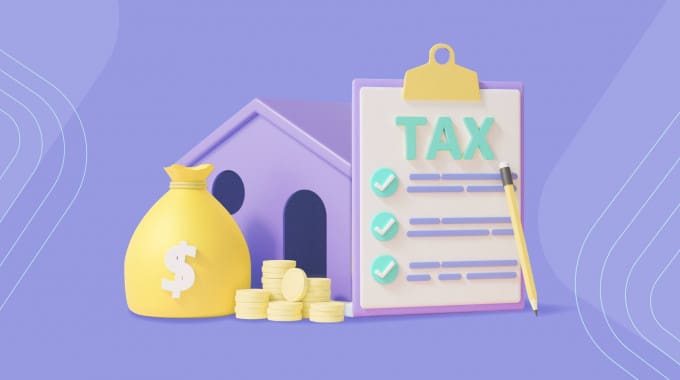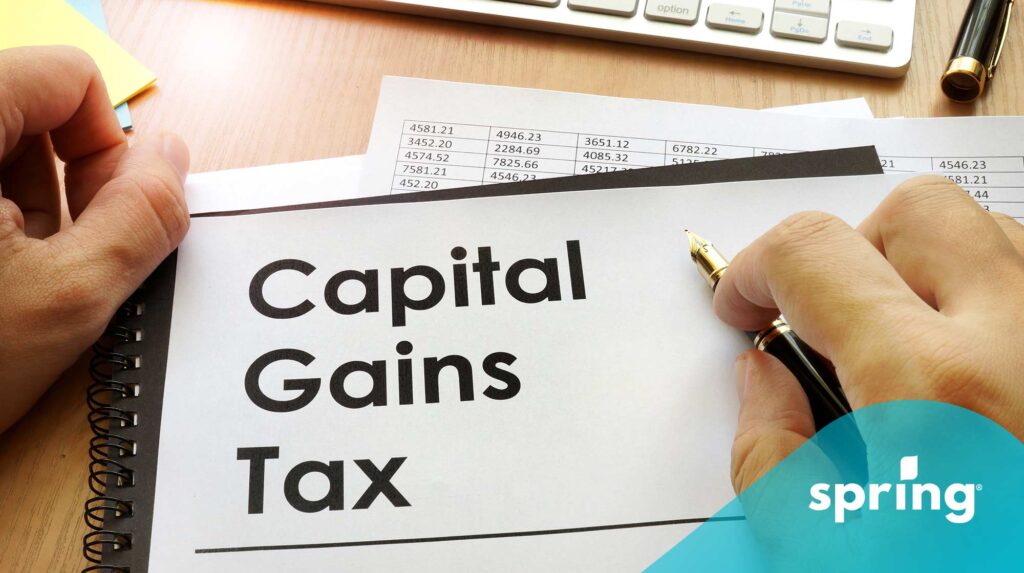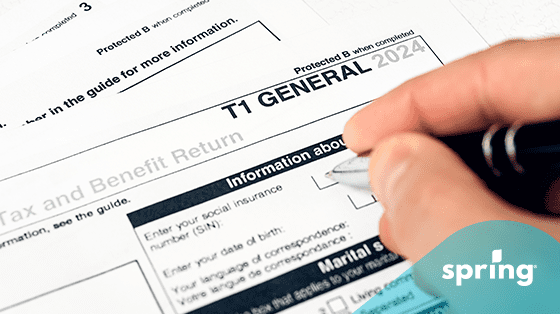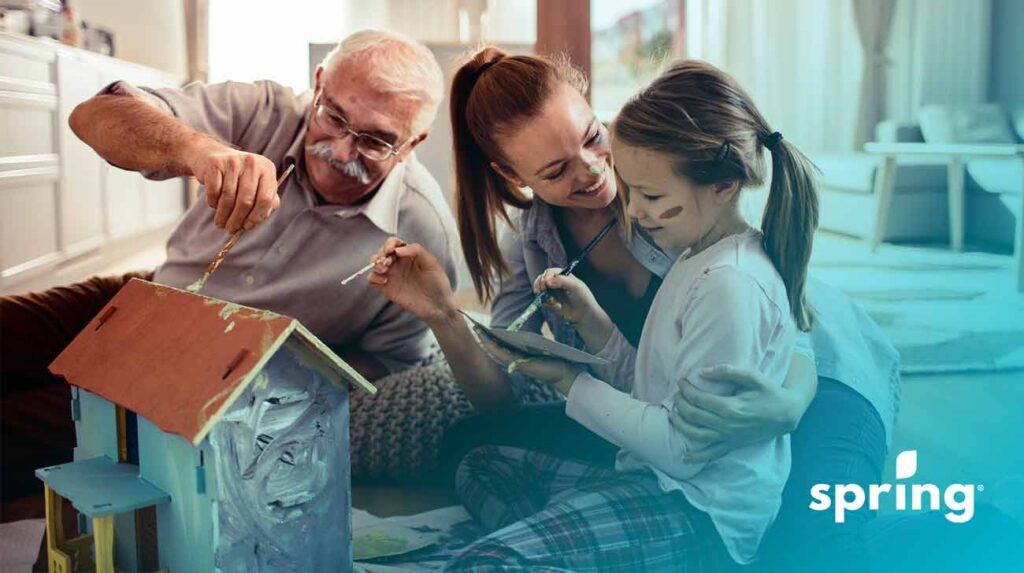Housing affordability is a sore subject for many Canadians. Real estate prices have increased 375% over the past two decades, surpassing disposable income levels by an astronomical amount. The average home cost is now a whopping $887,290 in Ontario and $913,471 in British Columbia.
With housing prices expected to stay steady in 2025, you may be wondering if you can afford a place as a first-time home buyer. Luckily, the federal government offers tax breaks like the First-Time Home Buyers’ Tax Credit and other financial incentives to help offset the cost of buying a home. Read on to find out which incentives could work with your specific situation.
What Is The First-Time Home Buyers’ Tax Credit (HBTC)?
Also known as the Home Buyers’ Amount or the Home Buyers’ Tax Credit, the First-Time Home Buyers’ Tax Credit is a non-refundable income tax credit that allows you to claim up to $5,000 for the purchase of a qualifying home. Qualifying homes are existing homes and homes under construction in Canada. Examples include single-family houses, semi-detached houses, townhouses, condo units, mobile homes, and more.
Who Qualifies For The HBTC?
To claim the Homer Buyers’ Tax Credit, you need to meet the following conditions:
- Buy a qualifying home and have it registered under your name or your common-law partner’s or spouse’s name.
- Intend to live in the home and make it your principal residence within one year after it’s purchased or constructed
- Be a first-time home buyer, which means you haven’t lived in another home owned by you or your spouse or common-law partner in the last four years.
Types Of Housing That Qualify For The Credit
Before you claim the home buyers amount that Canada offers, it’s important to verify that the type of housing that you’re purchasing qualifies. Qualifying homes include:
- Single-family homes
- Semi-detached homes
- Townhomes
- Mobile homes
- Condominium units
- Apartments in apartment buildings, duplexes, triplexes and fourplexes
It’s important to note that shares in cooperative housing corporations allow you to own a unit and give you equity interest. You also have to meet the above requirements in addition to meeting the housing requirements.
Claiming The Home Buyers Tax Credit Twice
Most people assume the Home Buyers’ Tax Credit is only for people who have never owned a home, but that’s not the case. You may claim the tax credit again as long as you (or your spouse or common-law partner) haven’t owned a home in the previous four years.
We should also point out that you don’t need to be a first-time home buyer to claim the credit if you’re eligible for the disability tax credit or buying the home for a relative with a disability.
With that in mind though, only one person can claim the credit per household. So, even if two people bought the home, only one person can claim it.
How Much Do You Get Back In Taxes From The First-Time Home Buyers’ Tax Credit?
The credit provides up to $750 in federal tax relief. It’s not a huge amount, but it can help cover smaller expenses like inspection fees, legal costs, and land transfer taxes. The credit is non-refundable, so if you owe less than $750 in taxes, you won’t get the remaining amount paid out in cash.
How Do You Claim The First-Time Home Buyers’ Tax Credit?
Claiming the Home Buyers’ Tax Credit is easy. Simply enter $10,000 on line 31270 (was line 369 before 2019) on your income tax return if you’re claiming the entire amount for yourself. You can also split the amount with your spouse or common-law partner, but keep in mind you can’t collectively claim more than $5,000. Remember to keep all your home-buying documents in case the Canada Revenue Agency (CRA) wants to review them later.
How Much Is It?
While you can claim up to $10,000 with your first-time home buyers credit, that isn’t how much you receive. You can receive up to $1,500. If you claimed before 2022 though, you would’ve only received $750.
Paperwork Needed To Prove You Purchased A Home
If you are claiming the first-time home buyers’ tax credit, you may be asked to prove it. In order to do this you just need the paperwork from the home purchase to show the sale. There’s no specific tax paperwork needed.
Does Home Inheritance Affect Eligibility For The First-Time Home Buyers’ Tax Credit?
If you inherited a house, it could affect your eligibility for the First-Time Home Buyers’ Tax Credit if the house was your principal residence in the past four years. However, if you inherited the home and sold it over four years ago and haven’t owned property since-you may still qualify for the tax credit.x credit.

Are tOther Tax Benefits For First-Time Home Buyers
There are a variety of tax credits, housing rebates, and other programs you can take advantage of.
- First-Time Home Buyer Incentive
Is saving for a 20% down payment taking too long? The federal government’s First-Time Home Buyer Incentive can finance 5% to 10% of your home purchase through a shared equity mortgage if you have the minimum down payment (5% of the purchase price) and are considered a first-time home buyer. That means the government will own some equity in the home and share the ups and downs of the property value. The incentive must be paid back after 25 years or when the house is sold.
A key aspect of this incentive is that you’ll repay the percentage you borrowed, not the amount. Let’s say you purchase an apartment for $200,000 and receive $20,000 from the incentive. If the home value increases to $300,000 after 25 years, your repayment amount would be $30,000 (10% of the current value).
- Home Buyers’ Plan (HBP)
The Home Buyers’ Plan makes it easier for you to save for your first down payment by allowing you to withdraw up to $35,000 from your registered retirement savings plan (RRSP). You can withdraw the money tax-free but must pay it back within 15 years. It’s also possible to take funds out from more than one RRSP however, you can’t withdraw from locked-in or group RRSPs.
- GST/HST New Housing Rebate
Unlike properties that have already been lived in, new homes are subject to sales tax. The GST/HST New Housing Rebate helps cover some of the GST/HST paid when purchasing or building a new house. The housing rebate is flexible and can also apply to costs associated with converting a non-residential property into a house or purchasing a substantially renovated house.
First Time Home Buyers Programs By Province
It’s not just the federal government that offers incentives. Many provincial (and municipal) governments are playing a part in helping first-time buyers get on the property ladder.
- British Columbia
Property Transfer Tax Exemption
The provincial first-time home buyers’ program reduces or eliminates the property transfer tax when you purchase your first home.
Home Owner Grant
This grant minimizes the property tax you pay for your principal residence. People living in the Capital Regional District, Fraser Valley Regional District, and Metro Vancouver can receive $570. Residents in other areas of the province are entitled to $770.
- Alberta
First Place Program
In Edmonton, the First Place Program redevelops vacant school sites into modern townhouses. First-time home buyers who purchase one of these properties get a five-year deferral on the land portion of their mortgage.
Attainable Homes
Created by the City of Calgary, Attainable Homes is a non-profit that helps first-time home buyers purchase a home with a $2,000 down payment.
- Saskatchewan
First-Time Homebuyers’ Tax Credit
This provincial non-refundable income tax credit provides up to $1,050 with similar eligibility rules to the federal Home Buyers’ Tax Credit.
Saskatoon Mortgage Flexibilities Support Program
Run by the Saskatoon municipal government, the Mortgage Flexibilities Support Program makes entry-level housing more attainable by offering first-time home buyers a 5% down payment grant.
- Ontario
Land Transfer Tax Refund
Get a full or partial land transfer tax refund if you’re a first-time home buyer and purchase an eligible home. The maximum you can get back from the provincial government is $4,000. The City of Toronto also has the Municipal Land Transfer Tax Rebate, which offers up to $4,475.
- Quebec
Home Buyers’ Tax Credit
Quebec has its own version of the Home Buyers’ Tax Credit. You could get a $750 tax credit if you purchase your first home in Quebec.
Montreal Home Purchase Assistance Program
This municipal program provides financial assistance up to $15,000 to help you purchase a new home. It also includes a real estate transfer tax refund if you buy a qualifying home and are a family with at least one child.
- Nova Scotia
First-Time Home Buyers’ Rebate Program
You can receive a rebate of up to $3,000 when you buy a new construction home.
Down Payment Assistance Program
This provincial program helps you attain a down payment by giving you an interest-free loan of up to 5% of a home’s purchase price.
- New Brunswick
Home Ownership Program
The Home Ownership Program offers repayable loans up to $75,000 to help you buy or build your first home.
- Prince Edward Island
Property Transfer Tax Exemption
The Real Property Transfer Tax is waived if you’re a first-time home buyer and have resided in the province for at least 183 consecutive days.
Down Payment Assistance Program
If you have a modest income and need help saving for a down payment, the Down Payment Assistance Program can give you an interest-free loan of up to 5% of a home’s purchase price. The maximum loan amount is $15,000.
Are Home Renovations Tax-Deductible In Canada?
Yes, you can claim select home renovation credits on your income tax return. There are also many grants and rebates you could qualify for.
Eligible renovations typically fall under two categories,
Making your home more accessible for seniors and people with disabilities:
- Home Accessibility Tax Credit
- British Columbia Home Renovation Tax Credit
- New Brunswick Seniors’ Renovation Tax Credit
- Ontario Seniors’ Home Safety Tax Credit
Examples of tax-deductible home improvements include:
- Walk-in tubs and wheel-in showers
- Grab bars and handrails
- Non-slip flooring
- Hands-free taps
- Motion-activated lighting
- Wheelchair ramps, lifts and elevators
- Door locks that are easy to operate
- Lowering or installing adjustable counters and cabinets
- Widening doorways and corridors
Making your home more energy efficient:
- Canada Greener Home Grant
- British Columbia Home Renovation Rebate
- Manitoba Home Insulation Rebate
- Manitoba Green Energy Equipment Tax Credit
- Quebec septic tank tax credit
- Quebec Rénoclimat program
Find more energy-saving rebates and incentives by province.
Eligible home improvements vary depending on the incentive, but typically include:
- Insulation
- Air-sealing
- Thermostats
- Solar panels
- Windows
- Doors
- Heat pumps
Saskatchewan also has a general Home Renovation Tax Credit. It covers renovations such as re-shingling a roof, adding new flooring, painting the interior or exterior of the property, updating a kitchen or bathroom, installing a central air conditioner, and much more.
Multigenerational Home Renovation Tax Credit
This is a new renovation tax credit that the federal government introduced in 2023. This credit is available to eligible individuals who create a self-contained secondary residence for a disabled relative who is eligible for the disability tax credit. This credit allows you to claim qualifying expenses once the renovation is completed using the combines total of all of your expenses.
Unlike other tax credits, this isn’t a non-refundable tax credit. It can help you get the maximum tax refund by allowing you to claim up to 15% or $50,000 in renovation expenses. This can get you a tax credit of up to $7,500. The idea behind it is to help cover the costs to improve accessibility for a related person who’s also a disabled person and is needing their own principal place of residence.
Related articles
- 5 Things Every First-Time Homebuyer Must Know in Canada
- Zero Down Mortgages in Canada: Buying a House With No Down Payment








